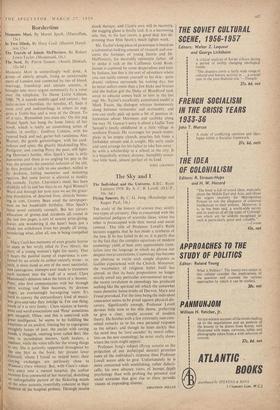Borderline
In Two Minds. By Mary Cecil. (Hamish Hamil- ton, 15s.) Memento Mori is compellingly well done. A group of elderly people, living in comfortable parts of London and connected by ties of blood, marriage, friendship and ancient amours, is 'brought into more urgent community by a voice over the telephone. To Dame Lettie Colston, OBE, 79, it sounds middle-aged and sinister: her sister-in-law Charmian, the novelist, 85, finds it most civil and undisturbing; to others its sug- gests a Teddy-boy and a man of the Orient. To all it says, 'Remember you must die.' On this peg Muriel Spark has hung the loose fabric of her novel, which is really an astonishing series of studies in senility: Godfrey Colston, with his ramrod back and sad, garter-belt randiness; Alec Warner, the gentle gerontologist, with his card- indexes and spies; the ghastly blackmailing Mrs. Pettigrew; and roaring Percy the poet, still light- ing Dowson's battles. Miss Spark's tone is drily humorous and there is no angling for pity in the way she presents the essential isolation of the old, as they pretend to talk to one another, walled in by deafness, failing memories and mounting egotism. Bul some horror is allowed to modify the comedy. Taylor, Charmian's maid, has been shabbily left to end her days in an Aged Women'S Ward and through her stoic eyes we see the grace- Jess dissolution of deserted lives, dotards bounc- ing in cots, Granny Bean amid the newspaper- • men on her hundredth birthday. Miss Spark's latest novel certainly compels. But her cursory allocation of graves and accidents all round in the last two pages, a sort of satanic prize-giving, leaves one wondering if she hasn't been just a shade too withdrawn from her people all along; wondering what, after all, one is being compelled to.
Mary Cecil has moments of even greater horror in store in her wryly titled In Two Minds, the story of a young woman's light for sanity. That it bears the painful stamp of experience is con- firmed by an article its author recently wrote: as such, it must stand as one of the most successful, and courageous. attempts ever made to transmute Such torment into the stuff of a novel. Clare 'Hammond's delusion takes the form of a 'demon,' Peter, who first communicates with her through .spirit writing and then becomes, by devious stages, an everlastingly haranguing voice: It's hard to convey the extraordinary kind of merci- less give-and-take they indulge in. For one thing, much of it is very funny: Clare rejoices in bawdy puns and word4issociations and 'Peter' sometimes gets snappish. Often, and this is contrived with great intelligence, he seems to be fulfilling the functions of an analyst, forcing her to regurgitate unsightly lumps of past, the uncles with roving hands, a thuggish, sneering lover called Bert. Shc runs to incredulous doctors, faith healers, a medium, while the voice tells her the wrong things to say. She is patiently supported throughout by the one blot in the book, her present lover .Edmund, whom I found an insipid bore:. their Cloying exchanges are perilously close to Woman's Own whimsy. But, with Clare's volun- tary entry into a mental hospital, the author resumes lirm command of her material, sketching an unforgettable picture of the flickering minds of the other patients, resentfully coherent in their mistrust of the hospital probers. Through insulin
shock therapy. and Clare's own will to recovery, the nagging ghost is filially laid. It is a harrowing tale, but, in the last resort, a good deal less de- pressing than Miss Spark's much lighter work.
Mr. Taylor's long piece of picaresque is based on a substantial-looking amount of research and con- cerns the fortunes of young Jaimie and Dr. McPheeters, his incurably optimistic father, off to strike it rich in the California Gold Rush. • Jaimie is captured by some desperadoes and later by Indians, but this is the sort of adventure where you can safely entrust yourself to his skin : quite drastic violence surrounds his waking day, but he never suffers more than a few kicks and bruises and the Indian girl the Duke of Blandford took away to educate comes back to him in the last reel. Mr. Taylor's excellently assimilated model is Mark Twain, the dialogue whizzes humorously along between vernacular and orotundity, and you can really pick up quite a bit of painless in- formation about Mormons and suchlike along the way. M. Gascar's story is about a Gallic Tom Sawyer's lonely childhood in a little village in southern France. He scavenges for peach-stones, plays in an empty church, poaches fish from a forbidden stream and is caught. His surly uncle and aunt arrange for his father to take him away : he wins a scholarship to a school in the city. It is a beautifully written, dreamy, incredibly evoca- tive little book, almost perfect of its kind.
JOHN COI.EMAN






































 Previous page
Previous page